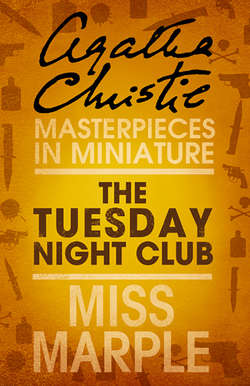Читать книгу The Tuesday Night Club: A Miss Marple Short Story - Агата Кристи, Agatha Christie, Agatha Christie - Страница 5
ОглавлениеThe Tuesday Night Club
‘The Tuesday Night Club’ was first published in Royal Magazine, December 1927, and in the USA as ‘The Solving Six’ in Detective Story Magazine, 2 June 1928. This was Miss Marple’s debut, a full two years before her first appearance in a full-length novel, The Murder at the Vicarage (Collins, 1930).
‘Unsolved mysteries.’
Raymond West blew out a cloud of smoke and repeated the words with a kind of deliberate self-conscious pleasure.
‘Unsolved mysteries.’
He looked round him with satisfaction. The room was an old one with broad black beams across the ceiling and it was furnished with good old furniture that belonged to it. Hence Raymond West’s approving glance. By profession he was a writer and he liked the atmosphere to be flawless. His Aunt Jane’s house always pleased him as the right setting for her personality. He looked across the hearth to where she sat erect in the big grandfather chair. Miss Marple wore a black brocade dress, very much pinched in round the waist. Mechlin lace was arranged in a cascade down the front of the bodice. She had on black lace mittens, and a black lace cap surmounted the piled-up masses of her snowy hair. She was knitting – something white and soft and fleecy. Her faded blue eyes, benignant and kindly, surveyed her nephew and her nephew’s guests with gentle pleasure. They rested first on Raymond himself, self-consciously debonair, then on Joyce Lemprière, the artist, with her close-cropped black head and queer hazel-green eyes, then on that well-groomed man of the world, Sir Henry Clithering. There were two other people in the room, Dr Pender, the elderly clergyman of the parish, and Mr Petherick, the solicitor, a dried-up little man with eyeglasses which he looked over and not through. Miss Marple gave a brief moment of attention to all these people and returned to her knitting with a gentle smile upon her lips.
Mr Petherick gave the dry little cough with which he usually prefaced his remarks.
‘What is that you say, Raymond? Unsolved mysteries? Ha – and what about them?’
‘Nothing about them,’ said Joyce Lemprière. ‘Raymond just likes the sound of the words and of himself saying them.’
Raymond West threw her a glance of reproach at which she threw back her head and laughed.
‘He is a humbug, isn’t he, Miss Marple?’ she demanded. ‘You know that, I am sure.’
Miss Marple smiled gently at her but made no reply.
‘Life itself is an unsolved mystery,’ said the clergyman gravely. Raymond sat up in his chair and flung away his cigarette with an impulsive gesture.
‘That’s not what I mean. I was not talking philosophy,’ he said. ‘I was thinking of actual bare prosaic facts, things that have happened and that no one has ever explained.’
‘I know just the sort of thing you mean, dear,’ said Miss Marple. ‘For instance Mrs Carruthers had a very strange experience yesterday morning. She bought two gills of picked shrimps at Elliot’s. She called at two other shops and when she got home she found she had not got the shrimps with her. She went back to the two shops she had visited but these shrimps had completely disappeared. Now that seems to me very remarkable.’
‘A very fishy story,’ said Sir Henry Clithering gravely.
‘There are, of course, all kinds of possible explanations,’ said Miss Marple, her cheeks growing slightly pinker with excitement. ‘For instance, somebody else –’
‘My dear Aunt,’ said Raymond West with some amusement, ‘I didn’t mean that sort of village incident. I was thinking of murders and disappearances – the kind of thing that Sir Henry could tell us about by the hour if he liked.’
‘But I never talk shop,’ said Sir Henry modestly. ‘No, I never talk shop.’
Sir Henry Clithering had been until lately Commissioner of Scotland Yard.
‘I suppose there are a lot of murders and things that never are solved by the police,’ said Joyce Lemprière.
‘That is an admitted fact, I believe,’ said Mr Petherick.
‘I wonder,’ said Raymond West, ‘what class of brain really succeeds best in unravelling a mystery? One always feels that the average police detective must be hampered by lack of imagination.’
‘That is the layman’s point of view,’ said Sir Henry dryly.
‘You really want a committee,’ said Joyce, smiling. ‘For psychology and imagination go to the writer –’
